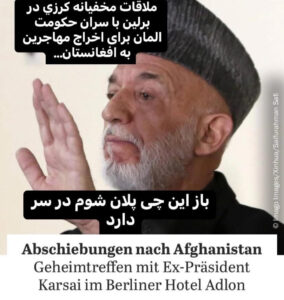
By: Former Army Journalist 1277 and Former Intelligence Researcher, ISAF Member
Date: July 10, 2025
Washington, D.C. – In a move drawing sharp criticism from human rights observers and international security experts, Germany is reportedly engaging former Afghan President Hamid Karzai as a discreet intermediary to open backchannel negotiations with the Taliban. According to multiple verified sources, Karzai is being used as a proxy by Berlin to bypass diplomatic and legal restrictions that currently prohibit direct talks with the Taliban leadership—many of whom are subject to international arrest warrants.
The revelation came to light through remarks made by August Hanning, former State Secretary at Germany’s Interior Ministry and ex-head of the Federal Intelligence Service (BND), to Die Welt am Sonntag. Hanning admitted to having held a confidential meeting with Karzai at Berlin’s exclusive China Club, stating:
“At a confidential meeting at the China Club, there was an intense exchange between Karzai and me.”
He emphasized Karzai’s ongoing influence, noting that despite leaving office in 2014, he “continues to play a central role as a mediator” and “possesses close contacts to the Taliban’s current leadership,” with authority to represent them in unofficial discussions.
This maneuver is raising serious ethical and geopolitical concerns.
The Shadow of the Past
Hamid Karzai’s legacy is far more complicated than that of a democratic statesman. Multiple eyewitnesses from Kandahar, now in contact with Kauser News Agency, confirm that Karzai’s father was present at the foundational meeting of the Taliban in June 1994. These first-hand accounts raise questions about the Karzai family’s historical ties to the very extremist group now ruling Afghanistan with an iron fist.
Germany’s decision to engage with Karzai as a bridge to the Taliban does not reflect realpolitik alone—it signals a disturbing normalization of a regime that has consistently violated human rights, particularly against women, minorities, journalists, and dissenters.
This approach is, frankly, a slap in the face to the victims of Taliban atrocities and to all those—Afghans and international partners alike—who fought for a democratic and humane future for Afghanistan.
Germany Must Remember 1989
The German government would do well to recall the deal of 1989, a dark episode in post-war diplomacy. At that time, Germany faced widespread international criticism for granting protection to war criminals while simultaneously deporting innocent civilians—a move that violated both international humanitarian standards and moral responsibility.
Evidence of that 1989 deal remains documented and available. It serves as a grim precedent that must not be repeated.
By once again offering indirect legitimacy and safe engagement to extremist actors through politically convenient proxies, Germany risks eroding the credibility of international justice. Protecting the powerful while abandoning the vulnerable is not diplomacy—it is complicity.
No Negotiations with the “Godfather of the Taliban”
Karzai, who has long positioned himself as a moderate figure in the West, cannot be disconnected from the extremist roots of the Taliban. His involvement as a negotiator is not a neutral act—it is an endorsement of a regime responsible for heinous crimes against humanity.
Negotiations with the Taliban must not come at the expense of memory, justice, and dignity. The German government must not deal with the “Godfather of the Taliban.”
As former ISAF personnel and intelligence experts, we have seen the price paid on the ground. We have buried our friends. We have spoken with the victims. We know what the Taliban is—and who helped them rise.
Germany must choose a side. Either it stands for justice and humanity, or it repeats the mistakes of 1989—this time, with even greater consequences.
Kauser News Agency – USA will continue its investigation into Karzai’s historical connections with the Taliban and will publish exclusive testimonies from Kandahar witnesses.

